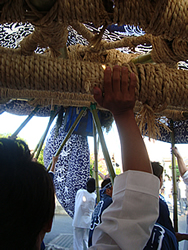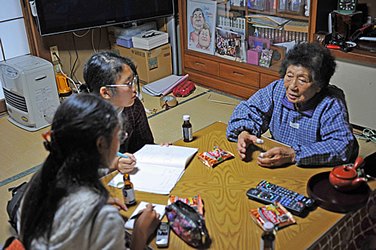コースの概要Outline of Courses


▲ (左)文化人類学実習で調査を行った獅子舞の「中」。実際にやってみることから見えることがある。
(右)民俗学実習では話者のお宅を訪ねて民俗行事の聞き書きなどを行います。
(left) The “Naka”, the Center part, of Shishimai, the Lion Dance. A scene from the Cultural Anthropology field work program. There are things you cannot figure out unless you actually have had experience of performing.
(right) A visit to a folklore teller’s residence to take interviews about folk events. A scene from the Folklore field work program.
社会の中で人間はどう生きているか、現場から学ぶ。
Getting to the field and finding out how people do in society.
文化人類学コースは「人間とは何なのか」を考えるコースです、といっても漠然としすぎているかもしれません。「人間とは何なのか」はいろいろな切り口が可能な問いですが、このコースでは、自らの関心にもとづいて決めた「フィールド」に飛び込み、そこにいる人々と関わりあい、その声に耳を澄ませ、彼・彼女らの生き方やものの見方を理解することを通じて、あるいは過去から受け継がれてきた様々な文献を「フィールド」として、この問いに立ち向かいます。人はつねに、様々な関係性をつくりだし、その可能性と制約のなかで何かを生み出したり、受け継いだり改変したりしながら、生きています。家族から地域、国、世界へと、あるいは過去から未来へと広がっていく、そうした関係性の網の目が、どのように織りなされ、そのなかで人はどのように形作られているのか。一緒に考えてみませんか。
“What are human beings?” is the query that Area of Cultural Anthropology goes after and looks into. This may sound too ambiguous. There are multiple ways of rushing in the query of “what are human beings”. Students enrolled in this Area work on this query by getting to the “field” selected according to the interests of one‘s own, interacting with the people who live there, listening carefully to their voice, and understanding the ways they spend life or see things, or by investigating various materials handed down from the past, considering the materials as the “field”. People consistently get involved in a variety of things and matters here and there, and within the potentials and constraints of such involvement produce something, take over and hand down, or modify the same. That is the way one’s life is. Networks of such involvement spread out from family to locality, country, and the world, or from the past to the future, and you will be marveled to see how such networks were composed and in what shape people are. Come join us, and you and we together find it out.

This Area provides an opportunity for students to take lectures and acquire “posture” and “perspective” suitable for looking at locality, and take practice trainings through field work. Then, students select a specific subject (locality) according to their own interests, work on it, and write graduation dissertation. At seminars, there always are discussions between different perspectives, which are stimulating yet in a pleasant and friendly atmosphere. Another characteristic of the Area is that because the faculty members include specialists in cultural anthropology, folklore, and history, coverage is broad, which is beneficial to students as they can obtain advice and counselling from multiple angles.
開設している主な授業 Subjects Offered
| 1年次生 1st year students |
文化人類学概論 民俗学概論 フィールド文化領域比較文化研究 |
| 2年次生以降 専門科目 2nd year and subsequent year students – specialty subjects |
文化人類学研究I~III 文化人類学研究演習I~IX 文化人類学実習I, II 民俗学研究I~III 民俗学研究演習I~V 民俗学実習I, II 中東・中央アジア文化研究I~III 東南アジア・オセアニア文化研究I~III |
教員
| 徳丸 亜木 Aki Tokumaru |
日本民俗学、比較民俗学 Japanese Folklores, Comparative Folklore |
| 木村 周平 Shuhei Kimura |
文化人類学、科学技術社会論、災害研究 Cultural Anthropology, STS (Science, Technology and Society), Disaster Studies |
| 塩谷 哲史 Akifumi Shioya |
中央アジア史、ロシア・ソ連史、イスラーム地域研究 History of Central Asia, History of Russia and the Soviet Union, Islamic Area Studies |
| 渡部 圭一 Keiichi Watanabe |
歴史民俗学、環境民俗学 Japanese Folkloristics (Environmental Folklore, Local History) |
| 佐本 英規 Hidenori Samoto |
文化人類学、音楽人類学、オセアニア研究 Cultural Anthropology, Anthropology of Music, Oceanic Studies |
- 2025年1月23日
- 印刷する